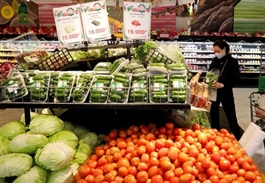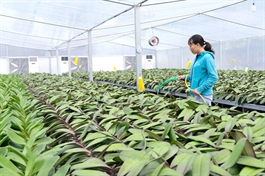Tough times for building materials sector
Tough times for building materials sector
The construction materials industry has seen revenue drop by $1 billion over the last two years and is valued at approximately $2 billion annually at present, far below its pre-pandemic figures. This observation came from Dinh Quang Huy, chairman of Vietnam Building Ceramics Association at a seminar held on June 10 in Hanoi seeking measures to help building materials firms out of their current difficulties.
According Huy, the local building materials market has almost come to a standstill amid a frozen real estate market and high-interest rates.
“Unless timely measures are taken to break the impasse, a number of firms in the sector will face bankruptcy,” he said.
According to representatives from the Vietnam Steel Association, the sector has been facing similar struggles for more than a year now. In the first four months of this year, raw steel production fell by around six million tonnes, or 22 per cent on-year, with steel consumption down 18 per cent to around 6.14 million tonnes, and exports of raw steel took a dive of 78 per cent to just 518,000 tonnes.
The concrete sector began 2023 with a full-year revenue target of $4.2 billion, equal to 130.2 million cubic metres (cu.m) of concrete. Consumption, however, has been stagnant, with approximately 32.4 million cu.m produced in the first quarter of this year.
Le Van Tho, deputy chairman of the Vietnam Glass Association, noted that the sector's revenue is expected to slide by 70-80 per cent in the first half of this year, marking a long-lasting stagnant period.
About 80 per cent of firms active in glass fabrication and installation had halted operation between 2020 and 2021 due to the pandemic. Currently, the total value of unsold stock in the industry is equal to about six months of production.
Pham Van Bac, director general of the Building Materials Department under the Ministry of Construction, revealed that the building material sector has been developing well lately, with output surpassing 10-30 per cent compared to actual demand.
“Amid economic recession, firms need to consider reducing production to match the actual market situation,” said Bac.
The leaders of the different business associations attending the seminar proposed the government to accelerate the pace of public investment disbursement, take measures to unlock the flow of capital into the real estate market, simplify procedures for a $5.2 billion preferential credit package for social housing, and allow a 2 per cent VAT reduction until 2024.

























